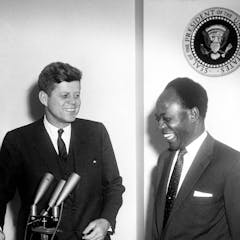
Articles on Colonialism
Displaying 321 - 340 of 592 articles

Two hundred years of forced dispossession cannot erase millennia of land ownership and connection to country.

250 years since Captain Cook landed in Australia, it’s time to acknowledge the violence of first encounters
The Conversation, CC BY63 MB (download)
The way Australia has commemorated Cook's arrival has changed over time – from military displays in 1870 to waning interest in Cook in the 1950s, followed by the fever pitch celebrations of 1970.

Explore Cook’s journey through the Pacific, the orders that brought him in search of the ‘Great Southern Land’ and the impact of his arrival in our new interactive.

An honest reckoning with Captain Cook’s legacy won’t heal things overnight. But it’s a start
The Conversation41.4 MB (download)
The impact of 1770 has never eased for Aboriginal people. It was a collision of catastrophic proportions.

To find out how the teaching of Captain Cook in Australian schools has changed, I examined textbooks used in the 1950s until today.

Botany was an integral feature of Britain’s colonial and imperial ambitions.

Every European ship that voyaged the Pacific was, in the first instance, a floating fortress, an independent command that could send out small shore parties or to concentrate firepower as needed.

Borders in southern Africa – as on the entire continent – were arbitrarily imposed by former colonial powers, and aren’t respected.

We need to understand colonial histories to understand climate risks.

The long history of racist beauty standards alone cannot explain the ongoing global use of harmful skin lighteners.

Studies of Kwame Nkrumah have been influenced by the political climate both within and outside Ghana.

During a recent visit to India, Trump spoke at the world’s largest cricket stadium. Cricket came to India in the 18th century through British sailors and is a revered cultural institution in India.

African American Vernacular English is part and parcel of Black identity. Its distinctive linguistic features are — wrongly — denigrated.

An oral history based biography of a survivor of colonial genocide in Namibia indicates instances of humanity during an entirely inhumane era.

If we’re ever to move past outmoded values of gender, race and class, we need to wish Prince Harry and Meghan Markle well — and challenge those who would prefer everything remains the same.

Compared to other politicians who tend to be indirect and evasive, Nkrumah was direct, explicit and assertive.

To confront colonialism, universities must open their archives and let communities see their pasts, eugenics and all.

The British Honours system and its link to empire is outdated and inappropriate, it must change.

Underlying direct or personal violence is structural violence that is entrenched in unequal power relations in society.

Dozens of Muslim-majority countries are asking the UN’s International Criminal Court to investigate and prosecute a 2017 massacre in Myanmar that killed an estimated 10,000 Rohingya Muslims.
